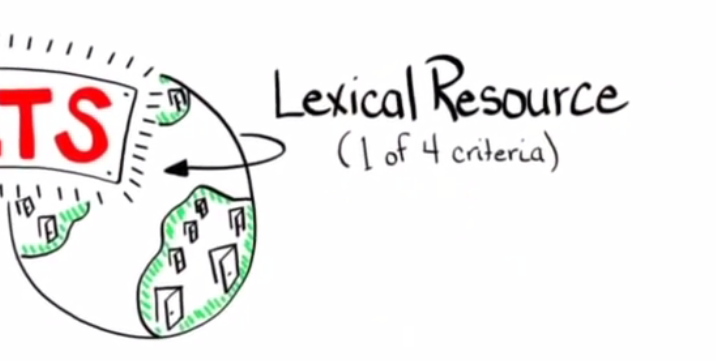(单词翻译:单击)
So you've decided to take the IELTS Exam, great choice! It's the test that opens doors around the world.
感谢选择报考雅思,雅思考试将为你在世界各地开启成功的大门。
Here we look at the criteria of lexical resource.
在这段视频中,我们将介绍雅思口语考试的评分标准之一——词汇多样性。
This is one of four criteria on which you will be tested, look for the other three criteria in other videos.
这是雅思口语考试的四个评分标准之一。我们会在其他视频中分别介绍另外三项评分标准。
Lexical resource focuses on the range of vocabulary a candidate uses.The wider the range, the better you will score.
“词汇多样性”着重考查考生所使用词汇的广泛性。使用的词汇越广泛,越多样,你的分数越高。

You will need to understand these factors to score well on the test.
要在考试中展现词汇多样性,你需要注意以下几点。
The ability to use vocabulary effectively, including the right collocation, that is words naturally used together.
首先是有效使用词汇的能力,这包括正确使用词语搭配,也就是通常用在一起的词语。
For instance, lion's roar, lions do not shout.Alternatively, we make a phone call, we do not do a phone call.
例如,lion's roar(狮吼), 而不是 lion's shout。再例如,我们说“make a phone call (打电话)”,而不是“do a phone call”。
And awareness of connotation.This refers to the positive, neutral or negative associations some words have.
其次是对于词义内涵的认识。某些词语可能含有褒义、贬义或中性的深层意义。
For example, laid-back, positive; inactive, neutral: lazy, negative.Slim, thin, skinny.
例如,laid-back褒义;inactive 中性;lazy 贬义。再例如slim褒义;thin中性;skinny贬义。
The use of less common vocabulary or expressions.
第三点是使用并不常见的词语或表达方式。
Many candidates memorize impressive lists of vocabulary but often end up using them in the wrong way, because they haven't understood them properly.
许多考生背诵很长很长的单词表,令人惊叹,但却无法正确地在交流中使用这些词汇,因为他们并没有真正理解其中的意思。
To improve your vocabulary, we recommend these steps.
我们建议从以下几个步骤丰富你的词汇。
Always try to learn new vocabulary when reading in English; look out for new words.
阅读英语的时候,要时刻想着学习新词汇,留意出现的新词。
Seeing words in their context helps you learn the meaning, usage and collocation.
了解这些词汇出现的上下文可以帮助掌握准确的意思、用法和搭配。
On-line newspapers are a good resource.These can also help you keep up on the vocabulary of current affairs.
电子版报纸是很好的学习资源。可以帮助你学习与时事相关的词汇。
Group new vocabulary into related subjects and learning these together, rather than making long lists of unrelated words.
把新学习的词汇根据不同的主题进行分组,然后以组为单位学习,而不要把互不相关的词语进行罗列。
For example, make a list of words about sports.Using mind maps often helps with this.
例如,列一组运动相关的词汇表。用思维导图来记忆也很有帮助。
Learn more synonyms.These are words or expressions which have a similar meaning.
尽可能多地学习同义词。也就是含有相似意义的词语或表达方式。
knowledge of synonyms will help with all parts of the IELTS Test.Try using a thesaurus.
掌握同义词对雅思考试的所有题目都很有帮助。你可以尝试使用同义词词典。
Make small word cards, with the word written on one side of the card and the translation and an example sentence on the other side.
运用单词卡学习词汇。把新词写在单词卡上,在背面注明翻译和例句。
You can then test yourself.Practices is the key.
你可以用词卡自测。最重要的是要练习使用这些词汇。
Not to memorize but to practice, discussing different topics, weaving in the vocabulary you have learned.
不要仅仅背诵词汇,要在讨论不同话题的时候,贯穿使用你学到的单词。
Research shows practice improves test scores.Don't give up if you can't find the right word.
研究表明反复练习可以提高考试成绩。如果想不到合适的词语,不要轻易放弃。
Keep trying to explain what you mean, even if it takes a little longer.
尽可能地尝试去表达你的意思,多花点时间也没关系。
This is called paraphrasing.You will get credit for this.
这种方法叫做改述。你的努力将会得到回报。
IELTS speaking tests include general everyday topics, specialist knowledge isn't expected.
雅思口语考试涵盖众多日常话题,考生无需对话题具备任何专业知识。
The topics are relevant to all of the one hundred thirty five countries in which IELTS is used.
这些话题在使用雅思考试的135个国家和地区都是适用的。
For more information, please see the other speaking test videos: fluency and coherence, grammatical ranging accuracy, and pronunciation.
请看其他的雅思口语考试备考视频,了解其他三个评分标准:流利性与连贯性、语法多样性及准确性,以及发音。


